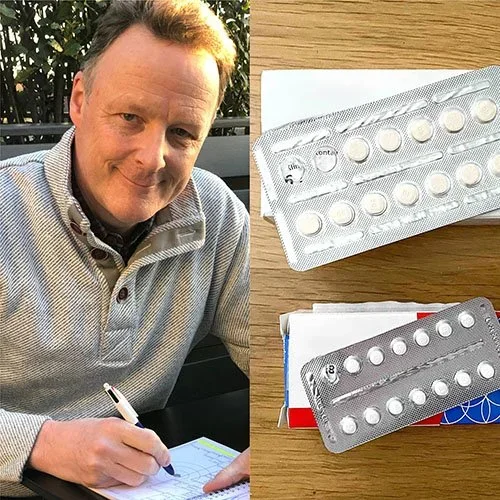The Unexpected Benefits of Mental Health Medication
A personal reflection on the unexpected benefits of taking medication for mental health—from reduced symptoms to small everyday moments of peace.
Taking medication improved more than just my moods. In this blog, I reflect on the surprising side benefits I never expected.
It is good to reflect on the importance of mental health—regardless of gender or age—and the crucial role medication can play.
One of the unexpected personal discoveries I've made over the years is the range of side benefits that come with taking medication for bipolar disorder and depression. Yes, my brain works better, my mind is clearer, and thinking requires far less effort. But other symptoms, ones I’d grown used to, have also faded away.
One was something I used to call “my brain falling off a cliff”. It felt like that moment when you fall asleep sitting up on a train—your head drops forward, then suddenly jerks back. Except for me, this same jolt happened inside my brain while I was fully awake. It could strike when I was sitting, standing, even walking. It came in waves, lasting days or even weeks, and nothing I did could stop it.
Years later, I heard others with bipolar disorder describe a similar feeling—like electric shocks in the brain. I suspect we were describing the same thing. I’d had that sensation since my teens, but in recent years, it’s faded. And now, it’s gone.
Another symptom resurfaced briefly a couple of weeks ago. I’d forgotten about it—until it returned for a few days. It’s that experience of waking up with a low-level but all-encompassing fear and anxiety, in both brain and body. It’s not as intense as some panic attacks I’ve had, but still disconcerting.
The thoughts that accompany it are always the same: “I’m not enough. I haven’t achieved enough. Nothing I do will make a difference.”
This time, I took a different approach. I didn’t try to fight it or solve it. I just focused on what I could do. I sat down for breakfast and paid attention to the taste of the food. Washing my face became a moment of awareness—feeling the warmth of the water and the texture of the towel. Walking to the coffee shop, I noticed the motion of my feet in my shoes. I followed the priority list I’d made the night before. And at some point, I realised the fear had gone. It lasted three days and hasn’t returned. Will this approach work every time? I honestly don’t know.
But what I do know is this: when your brain and body work without effort, it’s not a given. It’s a blessing.
Medication and Mental Health: How It Changed My Life
What’s the difference between depression and a bipolar low? This blog shares how I learned to recognise the signs—and why it’s helped me manage my mental health better.
An honest, first-hand account of starting, adjusting, and living with medication for depression and bipolar disorder—and how it transformed my journey.
I’ve been taking meds (sounds a bit lighter than “medication”) for over 20 years. I take two types—one for depression, one for bipolar.
At first, what I found unsettling was that there wasn’t a definitive test to determine what was going on. No blood test. No brain scan. Just me describing what was happening inside my head to a psychiatrist, who then made a diagnosis. It felt unscientific—too prone to error.
But over time, I’ve come to understand that each mental illness has its own distinct features. Unique patterns of thought, behaviour and language. If you’ve experienced one, you’ll likely recognise their descriptions.
Medication has also come a long way. What once felt like being hit over the head with a sledgehammer is now more like a well-aimed tap. One therapist I respected called them “vitamins for the brain”, which helped get me over the line.
The snag? What works for one person might not work for another. It felt like an experiment at first—but I was lucky. Although it took a few months to settle in, the meds worked for me on the first try.
I started with antidepressants. These were aimed at lifting the constant lethargy, that mind-numbing grey fog. I began with a low dose and slowly built up over six weeks. There were side effects: nausea, faintness (almost collapsing during a pitch to a top business school), constant yawning—which wasn’t great while coaching others. But within a couple of months, I had a brain that actually worked effectively. For the first time in my life. That felt amazing.
A year later, when the bipolar disorder was diagnosed, I began medication specifically for bipolar. This felt more serious. The doses are higher, and for the medication I was taking there was the potential for physical side effects such as liver damage. These meds help me regulate my moods and handle the minor highs and lows better. But my extended highs—especially the ones linked to my business ideas—were more difficult. The high would build over months and only when the stress became too much, I would crash. Hard. And while the meds can’t prevent every crash, I suspect they soften the crash slightly.
Meds can also lose effectiveness over time. During lockdown, I had three crashes in relatively quick succession. I reached out—first to my GP, then the local NHS psychiatrist who adjusted my medication for both bipolar disorder and depression. I started with the bipolar medication and before long, the depression, enhanced by the medication, took hold. It was brutal. Once the antidepressant was added, my mood lifted to a comfortable mid-point. It felt like a miracle.
Still, the bottom line is simple: medication has given me a life worth living. And my goodness, that feels superb.



